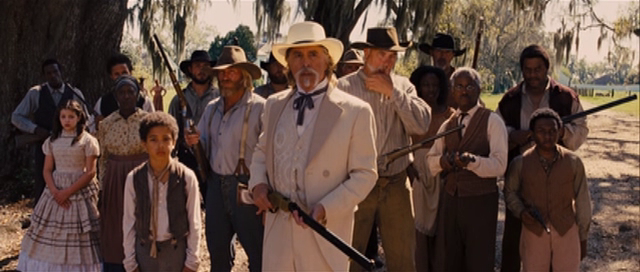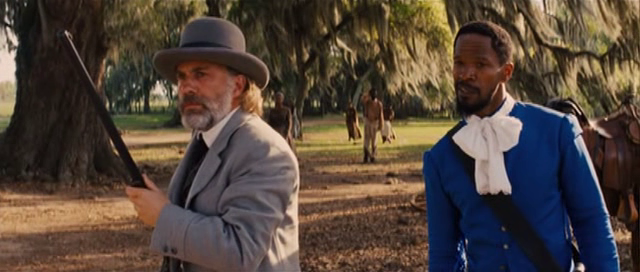
Django Unchained: “There could never really be justice on stolen land.”
January 8th, 2013 by david brothers | Tags: Colored Commentary, django unchained, quentin tarantinoThanks to Gone With the Wind and the desperate machinations of lost causers, the picture we have of the antebellum south is one of southern ladies in big skirts, lemonade, and stalwart men looking out for what’s right. The south, and the trappings of the south, are the closest thing us Americans have to royalty.
And people get into it, boy. You can buy all types of antique and blatantly racist trinkets and tchotchkes if you know where to look. People really dig on the Stars & Bars, too. Georgia finally managed to get it removed from the state flag, and whoops we just replaced it with a different Confederate flag sorry y’all. There’s a country music group based out of Nashville called Lady Antebellum, even. It’s real in the south.
The antebellum south, our picture of it, is built on a lie. The pastel paradise wouldn’t have, couldn’t have, existed without a grievous moral lapse on the part of all involved. It needed pain and scarred up backs to work. It ran on blood and tears and wasn’t the Disneyland you think it was.
It’s ahistorical, too. You can’t justify the slavery of Africans on any level if you know half of anything about history. You can’t argue that negroes were docile or particularly suited to slavery when you know how influential and diverse the black population of the world has been.
They could argue that back in 1858, sure, and they even brainwashed a lot of colored folk into believing that the story of Ham, Shem, and Japheth justified their toil. But it’s 2013. That kind of ignorance doesn’t play any more.
Django Unchained explodes the myth of the south, and it does so in spectacular fashion. We see two plantations — Big Daddy’s plantation and Calvin J Candie’s Candyland — and both have the appearance of the idyllic plantations of our fantasies. But once you take a closer look, you can see the rot inside them.
Big Daddy has a name like a pimp and more than a few notably light-skinned children on his plantation. Big Daddy carved out his own little slice of Miscegenation Heaven (™ and © Pedro Tejeda, 2013) and populated it with his legitimate and illegitimate family. Why do you think he makes the slaves call him Big Daddy?
Big Daddy’s slaves are generally well-dressed and the women get to play on swings when they aren’t working. It sounds like the prototypical happy slave situation, and we catch a glimpse of their fun as Django storms toward two men who did him wrong in the past. They’re about to punish a slave for dropping eggs by whipping her, and that’s your contrast right there. The impeccable table-setting, good ol’ homecooked food, mint juleps… none of that was the result of singing, happy-go-lucky, jolly slaves. That was the result of people who were beaten and maimed into submission. You complied or you got the lash. And the well-dressed pretty girls playing on the lawn? They’re Big Daddy’s prostitutes. Nothing is as pretty as it seems.
Candyland, on the other hand, is a small kingdom. Candie’s father and father’s father were cotton men, and they own one of the biggest plantations in the land. Calvin, though, has expanded into something else: mandingo fights. Take two strong slaves and pit them against each other in a fight to the death. Winner takes all.
Candie himself is the very picture of a landed southern gentleman. He’s a paragon of virtue, well-mannered, educated, fashionable, and positively cosmopolitan. He’s also corrupt. Worse than that — he’s corrupt amongst the corrupted. His daddy and his daddy’s daddy were in business. They beat, raped, battered, bought, and sold flesh to secure their fortune. Their descendant, though, has added pointless violence to the family’s repertoire, expensive gladiatorial combat.
The antebellum south was nothing to be proud of, and I like how Tarantino went about showing it. The usual train of thought goes that slavery was accepted at the times, just a product of the time, but let me ask you this: accepted by who? It certainly wasn’t accepted by the slaves, or else there wouldn’t have been over two-hundred different slave uprisings. So who was it accepted by? The people who had a vested interest in enslaving other people? That’s who we’re judging the past by? Greedy cowards? It gets harder and harder to sell or believe in the pastel paradise the more you look at what it took to create that paradise.
I think Tarantino feels similarly. Whenever you see Django doing something untoward for a negro at the time, slaves look at him with a stunned expression and quickly look away. It’s a “Did he just do that? Is he crazy?” look. They know what they can and cannot do, and the surprise and admiration they watch Django with is them wanting to see if he can get away with it. They know who they are and what they are expected to be, but, given half a chance… well.
Did you notice how insistent everyone in Django Unchained was that Django wasn’t a typical nigger? Big Daddy and Candie both talk about his exceptional nature, with an emphasis on the “exception.” Like this bit that got howls from the audience:
Big Daddy: Django isn’t a slave. Django is a free man. Do you understand? You’re not to treat him like any of these other niggers around here, ’cause he ain’t like any of these other niggers around here. Ya got it?
Betina: Ya want I should treat ’em like white folks?
Big Daddy: That’s not what I said.
Django’s exceptional, but he still ain’t a white man. But his exceptional nature is crucial, because the last thing you want to do is show these lil unexceptional niggers that they can be exceptional, too. Then the pastel paradise comes crashing down, and nobody wants that.
But if you keep positioning Django as just one man? Then you can keep control. You can keep the paradise and you can show the many that they are not, and never will be, the one. But they’re watching him anyway, aren’t they? They want a way out.
All it takes is one example.
Similar Posts:
- Django Unchained: “If they had my sense they would not serve any master in the world.”
- Django Unchained: “Coded language, man-made laws.”
- Django Unchained: “Negro from necro, meaning death: I overcame it so they named me after it.”
- Django Unchained: “Am I wrong ’cause I wanna get it on ’til I die?”
- Django Is Off The Chain



“Candie himself is the very picture of a landed southern gentleman. He’s a paragon of virtue, well-mannered, educated, fashionable, and positively cosmopolitan. He’s also corrupt. Worse than that — he’s corrupt amongst the corrupted.”
(Loving this series of articles) There’s a weird diffusion of tension in the movie when their plan fails – after all the tension, it turns out that Schultz is just out some money. It reminds us that candie’s acting pretty much completely within his “rights”. We need to know that Schultz and Django aren’t killing criminals, they’re killing normal citizens, and they fucking deserve it.
This series is friggen awesome, David. Keep up the good work!
I can’t help but think these pretty opinionated anti-Antebellum arguments are kinda bullshit. If you’re going to base the Antebellum era as evil and greedy due to slavery then you must be also be against the whole pre modern world. Prior to its end, slaves were used in every rising civilization so you also must, simply, be against everything that made the world modern. Ottoman Empire, Roman Empire, Zulu Dynasty as well as the Antebellum are all the same and to write them off as cowards is asinine and ignorant. Slavery WAS a product of the times
And to treat Django as a type of historical text to use in your vilification of the period, is beyond my rational thought. I’m sure abuses occurred, obviously, but to say this movie is a contrast to the picturesque view of 1800s South is just silly. I would post links if I felt confident they would be viewed but even brutal common sense says that if we’re agreeing that slaves were treated as property…why would someone willing wreck, potentially destroy their property? Its stupid and wrong to think that in was commonplace to beat one’s slaves for mistakes or even pit them in death fights against each other, when matter of fact it was viewed are reprehensible to beat one’s slave. Look it up if you don’t believe me
I haven’t seen Django, and honestly this series isn’t making me want to. The past is the past and to rewrite history to match your skew viewpoints is ignorant and irresponsible. To own another human being is wrong, that doesn’t need to be said, to call an entire era a lie based on an unfortunate truth is also wrong. Facts also are that the Antebellum was Gone With The Wind esque, and to not accept due to blindness or an relentless unwilling of acceptance is to me, the definition of butt hurt. And which also kinda sums up my point, that most people don’t care
The extreme irony of someone saying that the Antebellum was indeed ” Gone With The Wind esque” in a weak attempt to dismantle DB’s post.
And then using the words “butt hurt” is the clincher.
Kudos sir.
[…] and ending slavery (a big thanks to The Cultural Gutter for bringing the article to my attention). Others have pointed out that the originators of the “exceptional” label for Django are, in fact, racists, […]
I don’t think anybody believes slavery didn’t exist in other cultures and time periods. However American slavery took a rare form. Slavery in other cultures was a punishment for losing a war or falling into debt. Slavery in the Americas was based not on “spoils of war” or an “economic remedy” but based around the idea of inferiority and racism. And while that doesn’t negate the evilness of slavery in other cultures it adds an extra level of it to the American version.
@AgentCooper: Dude, in the Antebellum human beings were treated as disposable property. You can’t vilify that shit enough.
So who was it accepted by? The people who had a vested interest in enslaving other people?
What fascinates and horrifies me is how many people this included – the majority of them owning no slaves at all.
@AgentCooper:
The past is the past
Need I mention that it’s not?
@AgentCooper: Wow, how does it feel to go around being so wrong all the time?
@AgentCooper:
Doesb’t count. America was the first country in existence to make slavery permanent and inheritable. Even now, in a world in which plenty of people avoid being “slaves” by dint of being paid more than a penny a day, no one’s going to their (former) homes and turning their children into slaves as well. No one is taking the children that they conceive during wage peonage and immediately putting them to work. America invented the “Once a slave, always a slave, to your last generation”, paradigm.